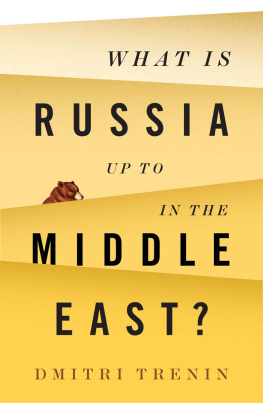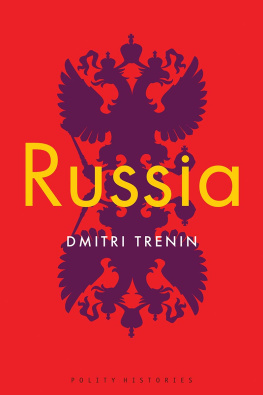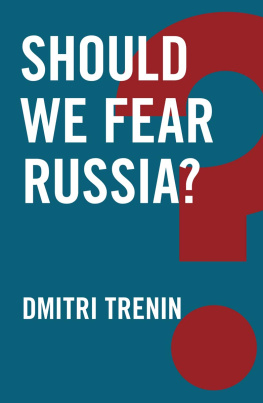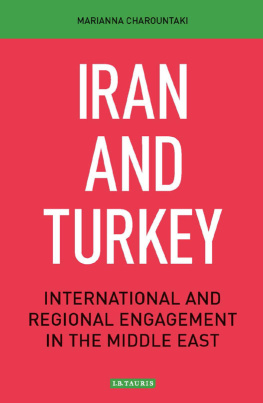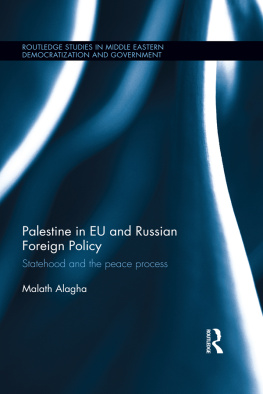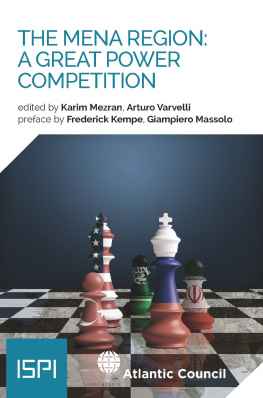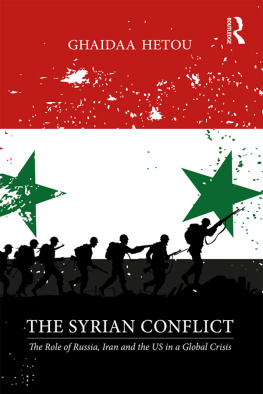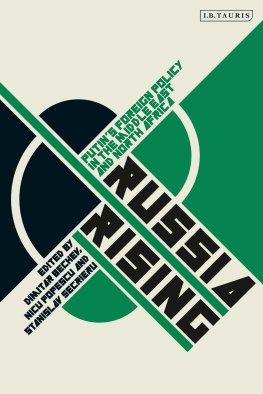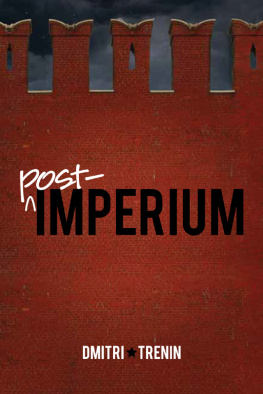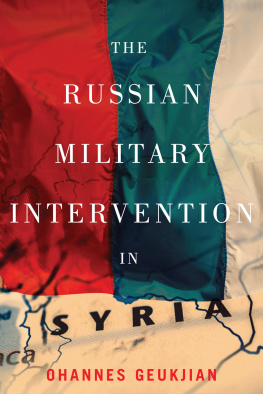Contents
Guide
Pages

What is Russia Up To in the Middle East?
Dmitri Trenin
polity
Copyright Dmitri Trenin, 2018
The right of Dmitri Trenin to be identified as Author of this Work has been asserted in accordance with the UK Copyright, Designs and Patents Act 1988.
First published in 2018 by Polity Press
Polity Press
65 Bridge Street
Cambridge CB2 1UR, UK
Polity Press
101 Station Landing, Suite 300
Medford, MA 02155, USA
All rights reserved. Except for the quotation of short passages for the purpose of criticism and review, no part of this publication may be reproduced, stored in a retrieval system or transmitted, in any form or by any means, electronic, mechanical, photocopying, recording or otherwise, without the prior permission of the publisher.
ISBN-13: 978-1-5095-2234-7
A catalogue record for this book is available from the British Library.
Library of Congress Cataloging-in-Publication Data
Names: Trenin, Dmitrii, author.
Title: What is Russia up to in the Middle East? / Dmitri Trenin.
Description: 1 | Cambridge, UK ; Malden, MA : Polity, 2017. | Includes bibliographical references and index.
Identifiers: LCCN 2017013099 (print) | LCCN 2017035139 (ebook) | ISBN 9781509522330 (Mobi) | ISBN 9781509522347 (Epub) | ISBN 9781509522309 (hardback) | ISBN 9781509522316 (paperback)
Subjects: LCSH: Russia (Federation)--Foreign relations--Middle East. | Middle East)--Foreign relations--Russia (Federation) | World politics--1989- | BISAC: POLITICAL SCIENCE / Globalization.
Classification: LCC DK68.5 (ebook) | LCC DK68.5 .T74 2017 (print) | DDC 327.47056--dc23
LC record available at https://lccn.loc.gov/2017013099
The publisher has used its best endeavours to ensure that the URLs for external websites referred to in this book are correct and active at the time of going to press. However, the publisher has no responsibility for the websites and can make no guarantee that a site will remain live or that the content is or will remain appropriate.
Every effort has been made to trace all copyright holders, but if any have been inadvertently overlooked the publisher will be pleased to include any necessary credits in any subsequent reprint or edition.
For further information on Polity, visit our website:
politybooks.com
To Vera, for making my life fun and worth living
Acknowledgments
The idea for this book came up in a conversation with my Polity publisher, Dr. Louise Knight. Louise encouraged me to take up what was then, in the wake of the Russian military intervention in Syria, a very topical issue, expand on it, and put it into the proper regional and global context. Throughout my work on this short book, I felt constant assistance and support from Louise Knight and assistant editor Nekane Tanaka Galdos. I am very thankful to the reviewerswho will remain unknown to mewho first assessed the idea of the project, and then critiquedand criticizedthe manuscript. I am also indebted to Eric Schramm, who edited the final text.
Last but not least, I thank my wife, Vera, for her understanding, good humor, and patience with me, particularly during weekends on the dacha as I was holed up in my study writing this short book.
Introduction
The Syrian civil war is a defining moment in the contemporary history of the Middle East as much as the 2003 U.S.-led invasion of Iraq. Like Iraq, Syria also has global consequences. The U.S. capture of Baghdad and the removal of Saddam Hussein from power was the high-water mark of U.S. postCold War global dominance. It became a symbol of Washingtons capacity to take and execute, single-handedly, virtually any decision affecting anyone in the worldeven, if needed, against the opinion of all other members of the international community. America was truly unbound as a foreign policy actor, unlike any other country in history. Then, a series of recent developments, from the 2008 global financial crisis to the Arab Spring to the Ukrainian crisis to the Syrian war, marked the end of that unique position and ushered in a more familiar pattern of several large countries of unequal size and power vying for influence and for their preferred concept of world order.
The Middle East is a microcosm of these developments, and is as good a model as any for twenty-first-century power games changing the global balance. The usual suspectsthose who for the past hundred years repeatedly intervened in the region, divided it into spheres of influence or sought to manipulate sociopolitical processes thereabove all, the United States and its Western European allieshave grown weary, disillusioned, and progressively disinterested. In the process, they lost both the strategic initiative and the sense of direction. Curiously, the country that has been on the ascendance, economically, for the past four decades, China, is not yet eager to plunge into the waters of global geopolitics, and is only testing those waters. Another emerging great power, India, is even farther behind. Most strikingly, one major player, which had been virtually absent from the regionand the worldfor the past quartercentury, Russia, is unexpectedly back in the game, and with gusto.
Moscow, of course, has not supplanted Washington as the principal actor or main security provider in the Middle East. It has no interest, no resources, and no intention to claim that role. What it has done instead is to have broken out of its post-Soviet condition of being essentially preoccupied with the former imperial borderlands and largely absent from the rest of the world. Thus, Russia has signaled that it is returning to the global stage as a major independent geopolitical player. If sustained, this move will affect the balance of power in a number of regions.
After it had disrupted the U.S.-dominated postCold War order during the 2014 Ukraine conflict, Russia did away with the de facto U.S. monopoly on the use of force globally. In 2015, it intervened militarily in the Syrian civil war to support the embattled government in Damascus. Many pundits scoffed at this intervention, as did the Obama administration in Washington, which confidently predicted a quagmire for Russia in Syria. Yet by the end of 2016, Russia and its allies on the ground managed not only to stabilize the situation for Bashar al-Assads regime and prevent the complete collapse of the Syrian state, but also put enough pressure on the Syrian opposition and its backers to initiate a ceasefire and a political dialogue about the future of the country. The odds are against it, but if successful, the combined deployment of Russias military power and its diplomatic resourcefulness could not only achieve a lasting result in the Middle East, but have a global impact as well.
Moscows direct involvement has changed the geopolitical alignment in the region. Russia formed a military coalition with Syria, Iran, Hezbollah, and Iraq, a country the United States de facto controlled for a decade following its invasion and occupation in 2003. The ongoing intra-Syrian political talks are being sponsored by the diplomatic trio of Russia, Iran, and Turkeya NATO member state that is now de facto allied with Moscow. The venue chosen for the talks is Astana, the capital of Kazakhstan, Russias main economic and security partner in Central Asia and an active member of the Shanghai Cooperation Organization, which brings Central Asian countries together with Russia and China and, starting in 2017, also includes India and Pakistan. Beijing itself has been consistently supporting Moscow on Syria at the United Nations Security Council.

